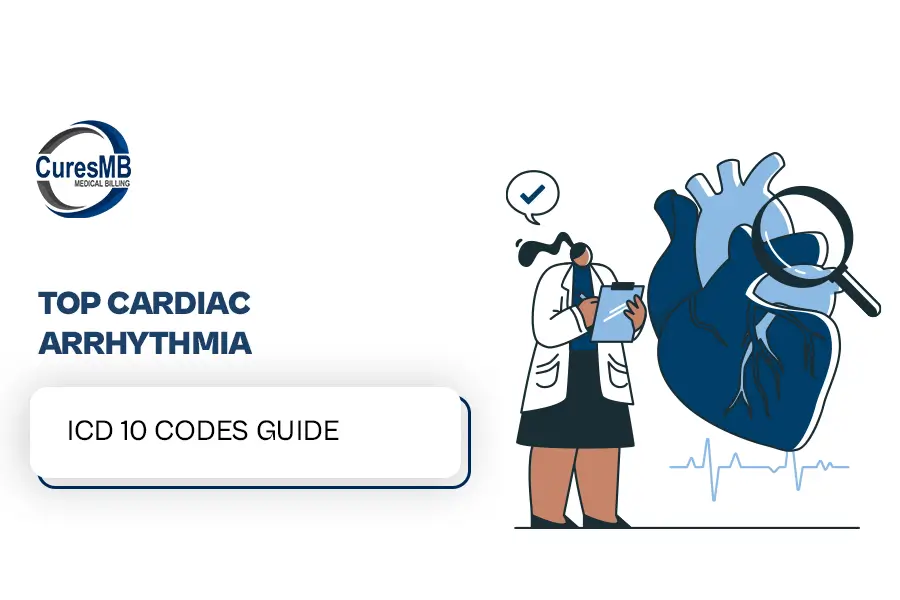
Cardiac arrhythmias, commonly known as irregular heart rhythms, affect millions of patients in the U.S. every year. Accurate documentation and ICD-10 coding are essential for reimbursement, compliance, and proper patient care.
Cardiac arrhythmia, also called irregular heartbeat or dysrhythmia, is a condition where the heart beats too fast, too slow, or with an abnormal rhythm. Common symptoms include palpitations, dizziness, chest discomfort, or shortness of breath. While some arrhythmias are harmless, others, like atrial fibrillation (AFib) or ventricular fibrillation, can be life-threatening and require urgent treatment.
The primary ICD-10 code for cardiac arrhythmia is:
Use this only when the medical record lacks specific details. Whenever possible, coders should select a more precise arrhythmia ICD-10 code to avoid denials.
Incorrect coding for cardiac arrhythmias often leads to:
Pro Tip: Always link arrhythmia ICD-10 codes to supporting clinical documentation such as ECG, Holter monitor, or stress test results to justify medical necessity.
Fill out the form below and we’ll contact you shortly.
ICD-10 Code | Description | When to Use |
I49.9 | Cardiac arrhythmia, unspecified | When no further detail is provided |
I48.0 | Paroxysmal atrial fibrillation | Intermittent AFib episodes |
I49.01 | Ventricular fibrillation | Life-threatening arrhythmia (often post-MI) |
R00.2 | Palpitations ICD 10 | When the patient presents with palpitations |
R00.1 | Sinus bradycardia ICD-10 | Abnormally slow heartbeat |
I49.8 | Other specified cardiac arrhythmias | Includes ectopic beats |
P29.1 | Fetal cardiac arrhythmia | Used in prenatal diagnoses |
Z86.79 | Personal history of cardiac arrhythmia | Follow-up visits after the resolution of arrhythmia |
Z82.69 | Family history of cardiac arrhythmia | Risk assessment in family history |
Accurate use of Cardiac Arrhythmia ICD-10 codes is essential for both clinical documentation and reimbursement. From palpitations (R00.2) to complex diagnoses like atrial fibrillation (I48.x) or ventricular arrhythmias (I49.x), coding precision ensures proper claim approval and reduces costly denials. With CMS updates and payer-specific rules, staying current is critical for cardiology practices.
Don’t let coding errors delay your payments. Partner with Cures Medical Billing Services for expert support in cardiology billing, denial management, and ICD-10 coding compliance.
Contact us today to streamline your revenue cycle and secure faster reimbursements.
The most general code is I49.9 Cardiac arrhythmia, unspecified, but coders should use more specific codes (e.g., I48.0 for atrial fibrillation) whenever possible.
Palpitations are coded with R00.2, which can be linked with arrhythmia ICD-10 codes if irregular heartbeat is confirmed.
No. Z86.79 (personal history) and Z82.69 (family history) should not be used for active arrhythmias. Use current arrhythmia ICD-10 codes instead.
If the patient reports palpitations, use R00.2. If testing confirms arrhythmia, also assign the appropriate arrhythmia ICD-10 code (e.g., I48.0 for paroxysmal atrial fibrillation). Both can be coded when documentation supports them.
Yes. Sinus bradycardia (R00.1) is a type of arrhythmia, but if the provider documents bradycardia along with another specific arrhythmia, both codes may be reported for accuracy and reimbursement purposes.
The correct ICD-10 code is I48.91 – Unspecified atrial fibrillation, with documentation specifying “with RVR.” Coders should carefully review provider notes to capture the RVR detail, as it may affect treatment and billing.
For past but resolved arrhythmias, use Z86.79 , Personal history of cardiac arrhythmia. For family-related risk factors, use Z82.69 – Family history of cardiac arrhythmia.
Discover Cures Medical Billing Services Across Different States
FL
NY
ML
CO
NJ
AZ
TX
CA
WA
We are a team of national medical billing service experts based in Astoria, NY, committed to providing ongoing value to our customers. We leverage technology and implement best practices to provide high-quality and cost-efficient medical billing solutions from domestic locations, enabling customers to achieve their business goals. Cures Medical Billing is the best option for any medical billing needs.
Medical billing around Astoria, NY, and beyond is our core competency and our specialists will efficiently manage all your billing needs. Our medical billing specialists have over 12 Plus years of experience with all security technologies to ensure data integrity for our customers. Using our medical billing service, anyone can make their medical billing task less resource-consuming.
Efficiency & precision in healthcare financial management with Cures Medical Billing, your trusted partner for smarter, faster, and more accurate billing solutions.
This site uses cookies. Read our Privacy Policy